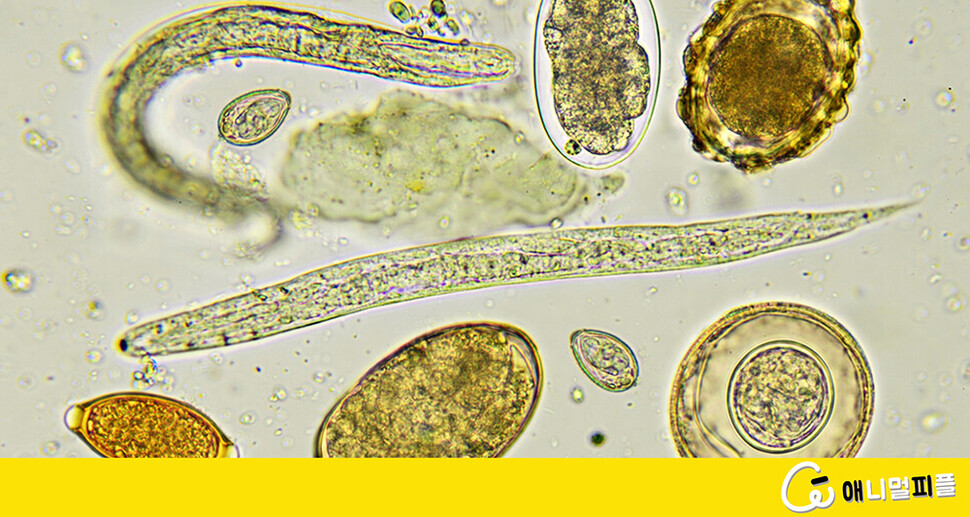[애니멀피플]
Evidence of inhibition of inflammation followed… Parasites prevent atopy, arthritis, and dementia

Intestinal parasites were dirty, disgusting, and embarrassing, but they are now emerging as a solution to prevent geriatric diseases. Courtesy of University College London (UCL).
When the parasite eradication project took place nationwide in the 1960s, pictures of epithelial diseases in textbooks maximized fear. It was a picture of a person’s leg swollen like an elephant’s leg after being infected with a parasite, a parasite in eastern India. However, it has recently been discovered that worms do not only bother people, but also prevent inflammation-related diseases. None of the 207 residents of the region with rheumatoid arthritis were infected with the worms, but as many as 40% of the 222 people in the healthy control group were infected with the parasite.

The human body overreacts when infected with the heartworm (top) and the heartworm, causing lymphedema. It has recently been shown that the worms inhibit rheumatoid arthritis. Bruce Chang et al. (2021) Provided by’This Life’.
In order not to suffer from chronic diseases and live for a long time, you may have to be deliberately infected with a parasite that did not exist. Researchers at University College London (UCL) such as Bruce Jang said in a paper summarizing the recent research results published in the recent issue of’E Life’ in the scientific journal, “There is accumulating evidence that inflammatory diseases such as rheumatoid arthritis increase without parasites.” The clinical research results show that the treatment that restores parasites in the intestine is effective in inhibiting inflammation-related diseases.”
_______
‘The old friend hypothesis’

Adults and eggs of various intestinal parasites in the stool. Humans have evolved and adapted to each other along with parasites. It is a relationship that does not harm one way. Getty Image Bank
The researchers explain that parasites are’old friends’ who have always been with us in the process of evolution, so they live by skillfully controlling the immune response of humans, and humans are not harmed too much. It is the so-called’old friend hypothesis’. The human immune system has evolved to best adapt to a dirty world, but when the microorganisms and parasites that lived together were removed, it caused a pathological immune hyperreaction. Researchers have found that parasite restoration is particularly effective in preventing aging-related inflammation, as well as allergies and autoimmune diseases. ‘Inflammatory aging’, which has recently attracted attention in relation to elderly diseases, refers to a phenomenon in which a low degree of inflammation persists due to a break in the balance between inflammation inducers and inhibitors. It is independent of the pathogen infection, and the severity gets worse with age. Inflammatory aging contributes to various aging-related diseases such as heart disease, dementia, cancer, and osteoporosis, but recently it has been found that it also works to worsen symptoms of Corona 19 infection. The cause of inflammation may be related to changes in the intestinal bacterial population, but the researchers pointed out that until now, the contributions of parasites such as fluke, helminth, and nematode have been neglected so far. However, a recent series of studies have revealed a link between parasite reduction and inflammatory disease. Asthma, atopic eczema, inflammatory bowel disease, multiple sclerosis, rheumatoid arthritis, and diabetes have found such an association, the researchers said.
_______
Parasite secretion as a treatment
If so, is there a way to use parasites for treatment? There have been reports of natural or artificial infections with parasites to alleviate or prevent disease, the researchers said. For example, a study of pregnant women in Uganda showed that anthelmintic infection was effective in preventing atopic eczema in babies, but not in pregnant women who took anthelmintic drugs.

Flatworms, candidates for parasites for therapeutic use. Bruce Chang et al. (2021) Provided by’This Life’.
“The least costly and most effective way to control inflammation,” the researchers wrote, is to have a persistent, low-level infection with the parasite. However, in order to avoid the safety issues (some parasites cause cancer) and psychological reluctance due to parasitic infections, the use of proteins obtained from the parasites for treatment is a promising method. In fact, some remarkable research results that use the secretions of parasites as a treatment have also come out. Last year, Jenny Crow, a researcher at Glasgow University in the UK, revealed that it succeeded in suppressing aging by causing an anti-inflammatory reaction in mice using the protein of nematodes. Professor David Gems, who participated in the study, said, “Needless to say, improved hygiene and eradication of parasites brought immeasurable benefits to humanity, but they had to pay the price of abnormal immune function.” It’s time to find out if it can give you benefits.” In this university press release said.

The appearance of the parasite roundworm that most of the people in Korea were infected with. Provided by the US Centers for Disease Control and Prevention.
In Korea, when the Parasitic Disease Prevention Act was enacted in 1966, a nationwide parasite eradication project was implemented. This is because the infection was so severe that parasitologists call Korea the’parasite kingdom’. In a survey conducted by the U.S. Military Government after liberation, the infection rates were roundworm 82.4%, flatworm 81.1%, and hookworm 46.5%. According to the 2016 article “The Social History of Roundworm Infections in Korea in the 1960s,” by Professor Jung Joon-ho of Seoul National University College of Medicine, parasite infections were common before that, but they were not dirty, disgusting, and shameful. It is recorded in the’Seungjeongwon Diary’ that Yeongjo said this after vomiting roundworms. “A roundworm is a human dragon with humans. There is nothing to be viewed as lowly.” Cited Papers: eLife, DOI: 10.7554/eLife.65180 By Cho Hong-seop, staff reporter [email protected]
